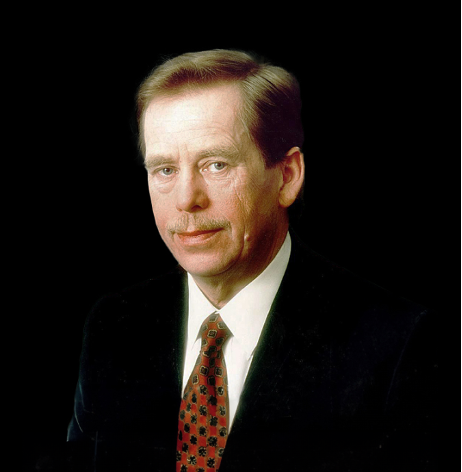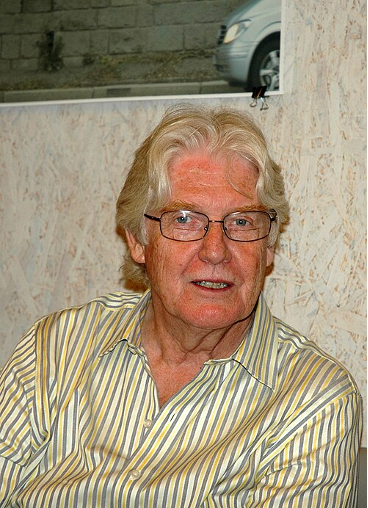Dramaturgical Resources
2025
The Memo
By Vaclav Havel (translated by Paul Wilson)
Over the course of the season, our assistant directors and student dramaturgs will be compiling dramaturgical resources relating to each production as it develops. Below are some links to websites which relate to the history of the play, the biography of the playwright, and sites that contextualize and, we hope, shed light on the directorial approach to the dramatic material.
We hope you find these resources of interest.

Václav Havel (October 5th, 1936 - December 18th, 2011)

Paul Wilson, translator (b. 1941)
Czechoslovakian playwright, revolutionary, and former president, Václav Havel is remembered for his critiques of authoritarianism, conformity, and the absurdities of government institutions. His plays tend to blend multiple stylistic genres of theatre with philosophical ideas. Absurdist theatre, a movement that used satire and surrealism to resist censorship and critique authoritarianism from the 1940s through the 1960s became a major form of resistance in Eastern Europe (also here). Czech postwar existentialism, the philosophical belief that we are each responsible for creating purpose and meaning in our own lives, also played a large part in the theatrical zeitgeist of Chechoslovakian theatre at that time. For Havel, the idea of an existential revolution meant questioning the authenticity of authoritarian control in a society recovering from war. He believed that such a revolution must come before the reconstruction of society. For him, this revolution consisted of resistance to a society that relied on the ever evolving nature of language to strengthen those already in power. Havel believed in searching for alternatives. Even today, his warnings about language and technology resonate in the new age of Artificial Intelligence. His plays ultimately expose how structures of corrupt authority dehumanize individuals and undermine democracy.
One of his most celebrated plays, The Memorandum, premiered at the Theatre on the Balustrade in Prague in 1965. At the time, the theatre had become the center of politically daring Czech drama, much of it absurd, under director Jan Grossman and set designer Libor Fára (Václav Havel had begun working at the theatre as a stagehand). Its staging of Havel’s play was significant because it coincided with growing unrest under President Antonín Novotný’s Communist rule, where a weak economy, severe censorship, and lack of personal freedom fueled widespread frustration and anger. This tension erupted into what became known as the Prague Spring of 1968, when Novotný was replaced by Alexander Dubček. Dubček’s program of reforms sought to loosen state control of the economy, relax censorship, and allow greater freedom of speech and political participation. Dubček remained committed to socialism and even pledged to stay within the Warsaw Pact, an agreement between the Soviet Union and several other European countries that read that if a NATO nation attacked a country in the pact, all the Warsaw Pact countries would come to its defense. However, Dubček’s reforms worried the Soviet Union. When he welcomed the communist President of Yugoslavia, Josip Broz Tito, whose country stood outside of Soviet control (and outside of the Warsaw Pact) to Czechoslovakia, the Soviet Union feared the reforms would destabilize the "Eastern Bloc" (i.e. those countries included in the Warsaw Pact). In response, the Soviets declared that they would not allow the countries of Eastern Europe to reject communism (this would later become known as the Brezhnev Doctrine; named after the Soviet leader at the time, Leonid Brezhnev). In August 1968, Warsaw Pact troops invaded Czechoslovakia to crush the movement. This led to Dubček’s arrest and the reinstallation of hardline Communist leadership. The brief moment where the theatre embodied a spirit of reform, with artists and intellectuals using the stage as a space to question authority and imagine alternative futures for Czechoslovakia, was unfortunately cut short. The Warsaw Pact invasion crushed the reform movement, and both Havel and Grossman were forced to leave the theatre.
The Memorandum reflects Havel’s concern with the dangers of bureaucracy as a tool of oppression. In the play, the introduction of a new, artificial office language becomes an allusion to the ways authoritarian regimes often impose systems that break up communication and, in so doing, assume power. Predictably, due to the political climate of the Cold War (when Havel was writing), the work was heavily criticized. Even before the Prague Spring, in 1967, during the Fourth Congress of the Writers’ Union, Havel openly denounced the Union for its undemocratic character and the Communist Party’s overall control. This led to his removal from the candidacy for the Union’s central committee. Soon after, Havel formed an independent group of writers from the Union who also shared his views called Charter 77. They wrote about the government’s lack of providing human rights provisions in documents such as the 1960 Czech Constitution and United Nation's Covenant on Human Rights. In 1968, Havel traveled to the United States to attend the New York Shakespeare Festival’s English-language premiere of The Memorandum (the production went on to win an Obie Award later that year for Best Foreign Play).
The version of the play that we are presenting, titled The Memo, was translated by Canadian publicist and essayist Paul Wilson.
Today, The Memorandum continues to stand out as a satire of bureaucracy, as well as a warning about the increased opportunity for governmental corruption and control in an age of political doublespeak (language that is intentionally distorted to mask the truth/support a particular ideology) and technological systems that can both connect and divide us. The question of how language can be used to empower or oppress remains urgent in a world where how quickly the government gets things done without wasting money or effort (i.e. government efficiency) is often valued above humanity. The U.S. Department of Government Efficiency (DOGE), for example, has been criticized as a modern instance of how efforts to streamline or “advance” government operations while aiming to “get things done” can also risk prioritizing speed and control over honesty, accountability, and the general impact that policy decisions have on the people. The Memo rings true today, when those in power use carefully crafted rhetoric, surround themselves with unquestioning followers, and create entire systems in an effort to conceal what they themselves are afraid of: the truth.
